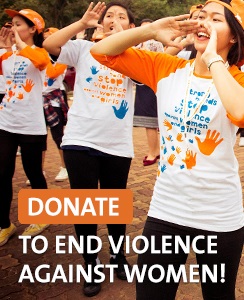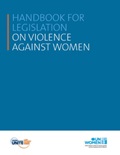Passing and implementing effective laws and policies
Legal systems and public policy frameworks have often overlooked the crisis of violence against women. In failing to protect the rights and well-being of survivors or punish perpetrators, many reflect social biases tolerating violence. Domestic violence and harmful traditional practices have often been seen as private matters that are “outside justice.”
Laws and policies can provide the foundation for a coordinated and comprehensive approach to violence against women (VAW). While a historic number of laws and policies against violence are now in place, implementation is still lagging behind. Measures to strengthen effective implementation should include training of officials who handle cases of violence against women, the establishment of mechanisms for monitoring and impact evaluation as well as accountability and better coordination. Committing adequate human and financial resources is also essential.
When brought into alignment with international human rights standards, such as those contained in the Convention on the Elimination of all Forms of Discrimination against Women (CEDAW), laws and policies can often play a positive role in changing attitudes and behaviours in the long term, especially when they are accompanied by complementary strategies such as awareness-raising on ending violence. Once laws are in place, they convey a strong message that violence against women is not tolerated and that it is the right of every woman to live free of violence.
Our Solutions
UN Women works to influence the adoption of advanced normative frameworks on ending violence against women and girls and partners with Governments and women’s advocates for their implementation through the adoption, strengthening and implementation of national laws, policies and strategies. After the Government of Cape Verde passed a comprehensive new law against gender-based violence in 2011, UN Women helped train judges, attorneys and police on implementation and assisted in disseminating information about the law to the general public. In Praia, the capital, a judge and two prosecutors now work specifically on gender-based violence cases. Court sentencing overall has fallen to two months—from as much as five years. The law mandates expanded services such as shelters and treatment programmes for offenders.
In Central America, UN Women-supported advocacy helped encourage both El Salvador and Mexico to enact legal reforms that define femicide as a criminal offence as well as measures to prevent and punish it. El Salvador also adopted a national protocol to guide investigations and saw its first conviction on a femicide charge. Guatemala, with legislation in place, drew on UN Women’s expertise to train nearly 550 prosecutors on taking cases to trial. At the regional level, in Latin America and the Caribbean, we are working with the Office of the High Commissioner for Human Rights towards the adoption of a regional model protocol for the investigation of femicide.
UN Women supported women parliamentarians and political leaders in Pakistan, as well as non-governmental advocates, in backing passage of sweeping new legislation to prevent the use of acid in attacks on women and to stop harmful customary practices. The Criminal Law Act 2011 for the first time levies prison sentences and fines for acid attacks, which were not recognized as a crime until recently. The Prevention of Anti-Women Practices Act penalizes cultural traditions once viewed as acceptable, including forced marriages.
The Palestinian Cabinet recently adopted the Arab region’s first national strategy to combat violence against women. With UN Women’s support, survivors of violence took part in drafting it. The strategy unifies existing efforts to end violence against women, covering: improved policing, the application of forensic science to violence cases, extended social services and better training of social workers. As one step towards implementation, the Cabinet agreed on a by-law allowing the Ministry of Social Affairs to require all shelters for survivors of violence to uphold quality and human rights standards. It draws from good practices developed at the UN Women-backed Mehwar Centre, a pioneering initiative offering women a full range of services to recover from violence, seek legal redress and develop livelihood skills. A new helpline, backed by web-based counselling and referral mechanisms, has given 18,000 callers access to potentially life-saving information.




